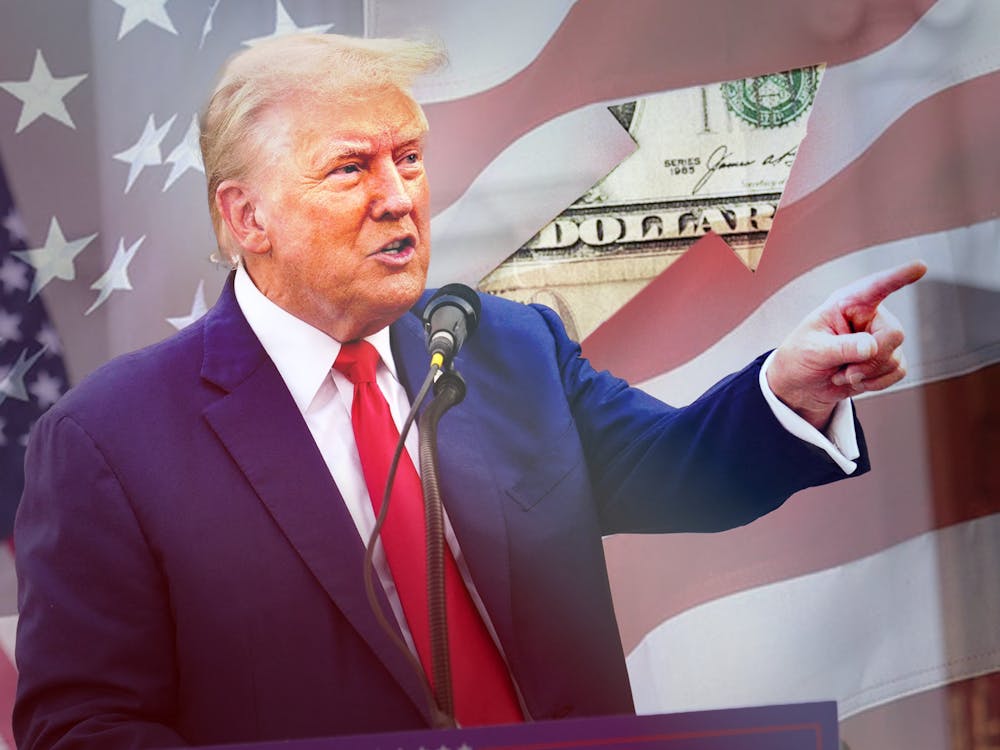Theo Jaffee said he believes Donald Trump and Elon Musk will reinvigorate the economy and “let the markets cook.”
Widespread economic discontent may have triggered the red wave that engulfed Jaffee and nearly 75 million others this election. The 20-year-old UF computer science junior voted for Trump, trusting him to slash government spending and lower the cost of living.
Trump seized on Jaffee and others’ disenchantment and promised to create disruptive structural change with plans to cut taxes, deregulate big business, deport millions of undocumented workers and impose sweeping tariffs on foreign goods. Gainesville’s tax and economics experts said consumers will soon feel the effects.
Jaffee said Trump’s economic agenda will tackle wasteful spending and bureaucratic inefficiency.
“In the best case scenario, there is a world where Trump seriously cuts federal spending again, with people like Elon Musk,” he said. “Elon's specialty is like going into big bureaucratic organizations and just delete, delete, delete.”
UF law professor David Hasen said no matter how much Trump and his cabinet scale back spending, his agenda could balloon the national debt by nearly $8 trillion.
But voters weren’t parsing the minutiae of the candidates' respective economic plans. In the run-up to the race, Trump enjoyed a 10-point lead over Kamala Harris on the economy.
Although she tried to distance her agenda from Biden’s, the vice president is tethered to an unpopular incumbency that presided over historic price shocks. Four in 10 Americans said inflation was their top economic issue, and the same proportion said they think Trump will improve their personal finances.
But Neil H. Buchanan, UF emeritus professor of law, said Trump isn’t likely to keep his promises and fulfill voters’ expectations.
“Certainly, there's nothing that Trump said or did that indicated substantively that he had any plans to make the economy better,” he said. “Specifically, if people are upset about high prices, you know, the last person you would vote for is the guy who loves tariffs.”
Trump vows to levy a “universal” tariff of between 10% and 20% on most imports and at least 60% on goods from China. Steep tariffs spook foreign exporters and drive up the cost of goods, a burden consumers must absorb. Economists estimate this could cost American households more than $2,600 annually.
That didn’t deter 18-year-old Gavin Schwanke from voting for Trump. The UF legal history freshman said he and fellow Trump supporters admired the president-elect's policies in the first term and hope he renews them in the second.
“I think a lot of people, at least under Trump, they loved his economic policies, lower taxes,” he said. “They saw the results under him the first time around, and they think they can get the results the second time around.”
Schwanke also addressed the potential inflationary impacts of tariffs. He said while consumers will initially feel the pinch of higher costs with jacked-up tariffs in place, the ends justify the means.
“It's more a long-term thing,” he said. “It's going to get worse before it gets better.”
Santa Fe College economics professor Jeffrey Haglund agrees the upsides of higher tariffs outweigh the downsides. He said the policy would create more domestic jobs, promoting economic growth.
“It repatriates,” he said. “It brings jobs to the United States that have been lost to lower-cost producers, which is going to create more capacity for people to purchase goods.”
Reconfiguring global trade could help the U.S. government raise funds to administer Trump’s tax cuts and other populist programs, which Derek Wheeler, director of UF’s low-income taxpayer clinic, said could benefit American families but by how much remains unclear.
“He's proposed some policies that, should they be implemented, might help low-income and middle-income people as well as high-income taxpayers,” Wheeler said. “But it's hard to say what the next four years are going to be with respect to the economy.”
Trump plans to extend his 2017 Tax Cuts and Jobs Act, which will expire in 2025. Along with lowering the corporate tax rate from 21% to 15%, he has also floated eliminating personal income tax on earnings, such as tips, overtime and Social Security benefits.
Harris proposed an “opportunity economy,” which included expanding the child tax credit, which grants eligible parents tax breaks on dependents under 17. She also planned to provide select tax breaks for small businesses and added Trump’s ‘no tax on tips’ policy to her agenda.
Wheeler said that despite the vice president's fresh slate of economic policies, voters felt she was too closely aligned with an administration they’d soured on.
“Undoubtedly, the economy is a very important measure of how people are going to vote, and if they're feeling that the economy is not working for them, then they're going to vote to change that,” he said.
Contact Natalie Kaufman at nkaufman@alligator.org. Follow her on X @Nat_Kauf.
Natalie Kaufman is the business enterprise reporter and a second-year journalism major. Outside the newsroom, you'll catch her drinking too much caffeine and running.





